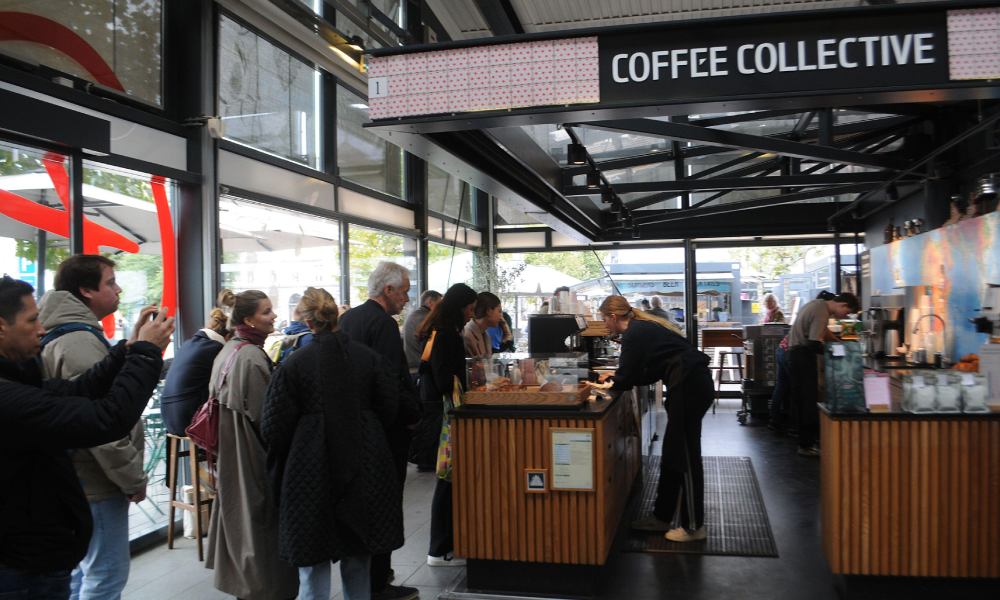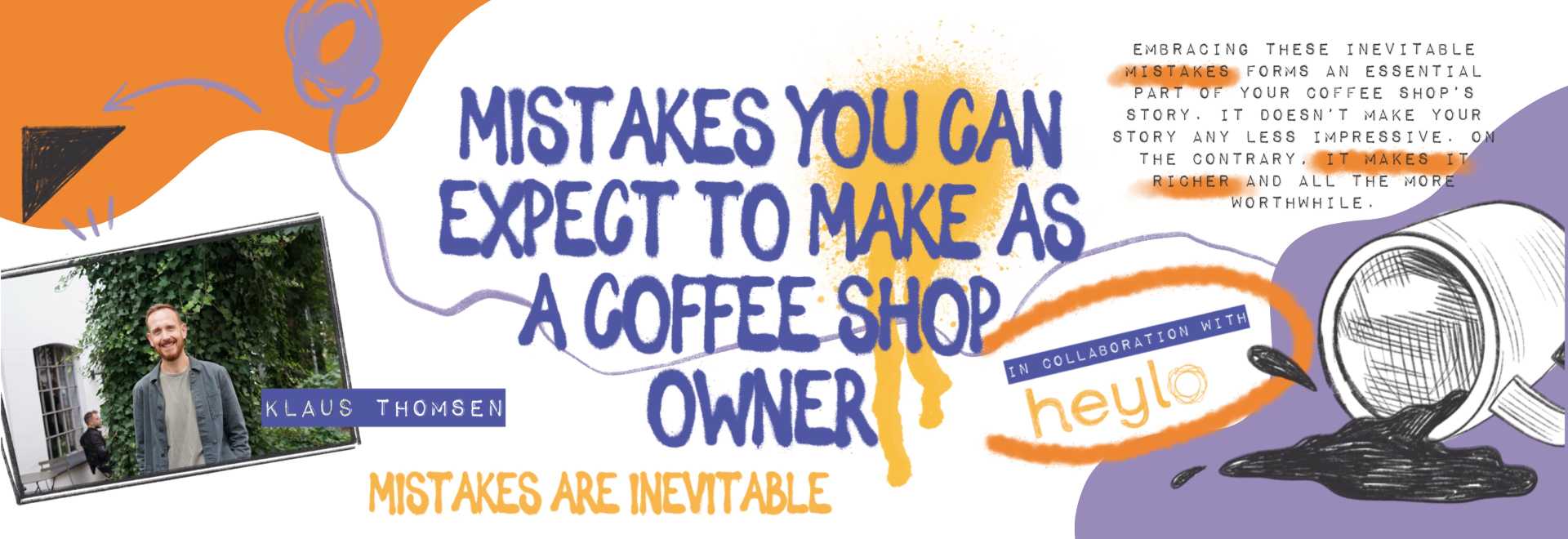Mistakes you can expect to make as a coffee shop owner
Matt Haw and Klaus Thomsen speak about common mistakes made by coffee shop owners in the third article of the series, #SpecialtyCoffeeMistakers
This article is the third and final in a series exploring the prevailing attitude towards mistakes in the specialty coffee sector. The series is produced in collaboration with Heylo Coffee, who are eager to kickstart a conversation around “mistakes” – beginning on a road to normalising them.
In the specialty coffee sector, there is a culture of meticulousness and striving for excellence. In some instances, this can lead to an air of perfectionism, where mistakes are looked down upon. This can put undue pressure on many actors across the industry, creating unnecessary stress.
Heylo is seeking to reverse this narrative: Mistakes do happen; and embracing them could foster a more open, healthy, and constructive environment.
This collaborative series will look at common mistakes made by baristas, coffee roasters, and coffee shop owners – not in an effort to expose people working in those roles; but to embrace failure as part of the process, and as part of life.
Coffee shop owner mistakes
For some, owning a specialty coffee shop is a dream come true, and it has the potential to be a rewarding and lucrative undertaking.
Specialty coffee is becoming more popular, expected to grow by more than 11% annually over the next seven years. According to a National Coffee Data Trends report, consumption hit a five-year high last year – with 43% of surveyed consumers choosing to drink specialty coffee in the past day.
But as they say, what comes easy won’t last; and what lasts won’t come easy. In other words, while it’s a dream that many have had, it takes effort, perseverance, and sacrifice to make a specialty coffee shop work.
In this process, mistakes are inevitable. For those thinking about opening a coffee shop – or are already in the midst of the chaos – an openness to making mistakes is advisable.
To this end, Klaus Thomsen, one of the co-founders of the legendary Danish specialty roastery and coffee shop chain, Coffee Collective, agreed to share some key mistakes made early on and some lessons learned along the way.

Location, location, location
Many people in the coffee industry would argue that location is one of the biggest factors determining a coffee shop’s success.
“When we started, we opened in a tiny street called Jægersborggade which was known for being a bit dodgy. The rent was cheap and that was the biggest priority for us,” says Klaus.
Cheap rent can be a significant pull for a new business with limited access to start-up funds. While taking a careful approach to your budget is sensible, this can leave a coffee shop with limited visibility and low footfall – which can be a make-or-break factor.
Despite this, Klaus suggests there are still ways to make a low-footfall location successful. It often requires more work to put your brand out there, but once customers know about it, they will travel to try what you’re selling.
“We relied heavily on people realising that we were hidden close by,” says Klaus. “I think that can work as a strategy to create something very unique.”
Their second location opened in Roskilde. Viewing the property on a sunny, bustling Saturday, things were looking up.
“That was mistake number one,” says Klaus, admitting that he hadn’t researched the area thoroughly enough. “You need to know what a place looks like on the bad days as well.”
After running at a loss for 6 months, Klaus and co decided to close. On the face of it, this could be considered a mistake. However, they were quick to realise the reality of their situation, and called it quits before driving their business into further trouble. Furthermore, Coffee Collective now run 8 coffee shops – they have clearly learned a valuable lesson on how location affects sales and overall success.
Budgeting for the unexpected
In many instances, motivations for opening a coffee shop come from a place of passion – passion for brewing, or creating a welcoming environment. However, this does not necessarily translate into business know-how. As such, mistakes can often occur when it comes to financing and budgeting.
A common suggestion for prospective coffee shop owners is to double the amount you think you’ll need. In Klaus’ experience, however, an inflated budget is not always the best approach.
“Don’t make a budget thinking in the back of your mind that you’re going to go over by 50%, because then there’s no point in making a budget,” he says.
This doesn’t mean that unforeseen expenses shouldn’t be accounted for. Coffee Collective tend to build a buffer of 10 to 20%. It can be difficult to not spend this safety net – especially when the shiny finishing touches you’ve dreamt about are within reach – but Klaus suggests restraint at this stage is necessary if you intend to survive as a business.
Operational mistakes
From an operational aspect; there are common pitfalls that coffee shop owners can fall down. These are often dictated by the size and structure of the business. For example, the systems involved in quality control and staff training will depend on how they are implemented – and by whom.
For example, an owner of a small independent coffee shop may want to oversee all aspects related to quality and training. However, the owner may not have the breadth of knowledge to teach his staff effectively, or the owner simply may not have time on top of all the additional responsibilities.
Conversely, a larger organisation may struggle to designate someone to thoroughly manage quality control; or employees in charge of staff training may struggle to effectively communicate the values of the business.
For Klaus, establishing a clear business structure with defined job roles from the outset is crucial – for small and large businesses alike.
“What you want to avoid is having three or more people who all think they’re the boss running around giving directions,” he says.
This means that a shift behind the coffee machine is spent in the role of a barista – even as a co-founder of the business. “If you suddenly want to discuss recipes or whether or not we should start brewing aeropresses, save that for an operational meeting, put it aside and we’ll discuss it Monday morning,” says Klaus.
A DIY approach
In certain instances across the specialty coffee sector, businesses can take a DIY approach. This often manifests in their decor and a relaxed atmosphere. However, if this same approach extends to how coffee shop owners manage their business, it could lead to costly mistakes.
Monthly board meetings are held at Coffee Collective, where co-owners meet to think strategically about the direction of the business. Klaus admits that this felt awkward at first: “It was just the same four people in all these different meetings.” However, once you get used to it, these types of conversations can generate real value and a sense of purpose for any business.
This approach paid its dividends. Coffee Collective is now expanding beyond Copenhagen to Denmark’s second city, Aarhus; and also just marked its 15th year in business.
However, Klaus and the team at Coffee Collective didn’t get this far without making mistakes along the way. For coffee shop owners, engaging with these stories not only means you stand a chance of avoiding similar mistakes in the future, but also can provide reassurance when they inevitably occur.
At the end of the day, embracing these inevitable mistakes forms an essential part of your coffee shop’s story. It doesn’t make your story any less impressive. On the contrary, it makes it richer and all the more worthwhile.
New Ground Coffee
Want to read more articles like this? Sign up for our newsletter!








